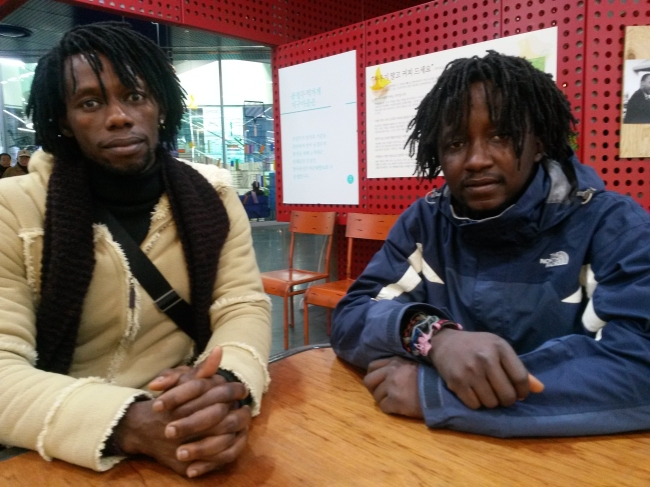Africa museum exploitation not isolated case: diplomats
Envoys recall African performers exploited in the past; museum director was a regular in the diplomatic circuit
By Korea HeraldPublished : Feb. 16, 2014 - 19:49
African diplomats here reacted with shock and disappointment to news of the appalling treatment of artists and performers working at the African Museum of Original Art, relating stories of their own with officials there.
Eight performers from Burkina Faso and four sculptors from Zimbabwe met with museum officials on Thursday to negotiate wages and working conditions, just three days after it was exposed that, since they arrived in 2012, they had been receiving half the legal minimum wage, were living in substandard housing, and had their passports confiscated.
“The contract I signed stipulated I would perform three times a day, but from the beginning I was playing as many as five times daily. I also had to clean the museum and teach children music,” said Emmanuel Migaelle Sanou. The 34-year-old dancer said he would like to put the labor problems behind him and continue to work in South Korea.
Eight performers from Burkina Faso and four sculptors from Zimbabwe met with museum officials on Thursday to negotiate wages and working conditions, just three days after it was exposed that, since they arrived in 2012, they had been receiving half the legal minimum wage, were living in substandard housing, and had their passports confiscated.
“The contract I signed stipulated I would perform three times a day, but from the beginning I was playing as many as five times daily. I also had to clean the museum and teach children music,” said Emmanuel Migaelle Sanou. The 34-year-old dancer said he would like to put the labor problems behind him and continue to work in South Korea.

The visas of the eight from Burkina Faso expire on Feb. 28. Although he would like to come back, Sanou said he has no confidence the museum will sign a new contract with him with the proper conditions.
One African envoy may have shielded performers from his country, as he turned down a deal with the museum to recruit artists from Kenya.
Kenyan Ambassador to South Korea Ngovi Kitau said he had engaged in negotiations with Park from June 2012 to January 2013 on recruiting Kenyan artists to work at the museum. But Kitau eventually rejected the idea, “because the museum could not meet my minimum requirements, including return airfare, per diem allowance and decent accommodations.”
Neither Burkina Faso nor Zimbabwe has a diplomatic mission in South Korea. Their diplomatic relations are maintained from their embassies in Japan.
News of their treatment spread through the local media in part because the museum’s owner is Rep. Hong Moon-chong, a high-level Saenuri Party official. One African diplomat said that it was incidents like this one that propagate a negative image of South Korea in African countries.
“What do they think these artists will say about Korea when they go back to their homes in Zimbabwe and Burkina Faso?” he said.
Hong claimed he left day-to-day operations to the museum’s director, Park Sang-soon, and vowed to get to the bottom of what happened. At the Thursday meeting, the 12 African artists discovered Park had been replaced by Kim Chul-ki, the museum’s incoming director.
The artists had their passports returned to them, and were promised their back pay during the meeting with museum officials. The 12 were also compensated for the exploitation they endured with 2 million won each. The same day, they also met with an official from the Korea National Commission for Human Rights.
“I just felt what he was paying was really peanuts for the kind of jobs they were doing. These guys are supposed to perform once a day, too,” Ambassador Kitau said. “And his argument was that Kenyans are too expensive.”
Abdoul Razak Ouedraogo, a 27-year-old musician from Burkina Faso, said he believes his problems with the museum would not have gotten so bad if he had access to consular services here. Sanou agreed.
“There are about six of us that would like to continue working out a way to stay here but this is much more difficult since we have no embassy here,” he said.
Four Zimbabweans and two from his country want to continue working here, Oudraogo said.
Three African diplomats independently identified Park as a regular at embassy functions, and said they had talked with him on several occasions about cultural tourism operations like that of the African Museum.
An official at the Ivorian Embassy related a similar incident that took place years ago.
“We had similar problems at the African Village in 2002 with a group of Ivorian performers who were being badly mistreated. It was a long time ago, but I believe the performers decided they wanted to go home,” said an official at the Ivorian Embassy here.
The Ivorian artists were underpaid and endured poor working conditions as well.
The African Village opened in Namyangju, Gyeonggi Province, in 2002, only to close down two years later. The African Museum of Original Art opened in nearby Pocheon, Gyeonggi Province, in 2006.
By Philip Iglauer (ephilip2011@heraldcorp.com)
-
Articles by Korea Herald





![[K-pop’s dilemma] Can K-pop break free from ‘fandom’ model?](http://res.heraldm.com/phpwas/restmb_idxmake.php?idx=644&simg=/content/image/2024/05/09/20240509050541_0.jpg&u=20240509173751)




![[News Analysis] Yoon's first 2 years marked by intense confrontations, lack of leadership](http://res.heraldm.com/phpwas/restmb_idxmake.php?idx=644&simg=/content/image/2024/05/09/20240509050612_0.jpg&u=20240509233252)








![[Today’s K-pop] NCT’s Mark to drop 1st solo album in February 2025](http://res.heraldm.com/phpwas/restmb_idxmake.php?idx=642&simg=/content/image/2024/05/10/20240510050597_0.jpg&u=)